
Screwball comedy is a film subgenre of the romantic comedy genre that became popular during the Great Depression, beginning in the early 1930s and thriving until the early 1950s, that satirizes the traditional love story. It has secondary characteristics similar to film noir, distinguished by a female character who dominates the relationship with the male central character, whose masculinity is challenged, and the two engage in a humorous battle of the sexes.

Love Affair is a 1939 American romance film, co-starring Charles Boyer and Irene Dunne, and featuring Maria Ouspenskaya. It was directed by Leo McCarey and written by Delmer Daves and Donald Ogden Stewart, based on a story by McCarey and Mildred Cram. Controversial on concept, the official screenplay was re-tooled and rewritten to appease Hollywood censorship and relied on actor input and improvisation, causing long delays and budget extensions.
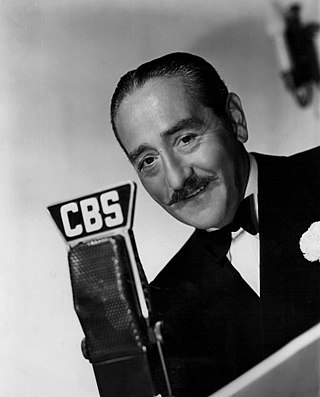
Adolphe Jean Menjou was an American actor. His career spanned both silent films and talkies. He appeared in such films as Charlie Chaplin's A Woman of Paris, where he played the lead role; Stanley Kubrick's Paths of Glory with Kirk Douglas; Ernst Lubitsch's The Marriage Circle; The Sheik with Rudolph Valentino; Morocco with Marlene Dietrich and Gary Cooper; and A Star Is Born with Janet Gaynor and Fredric March, and was nominated for an Academy Award for The Front Page in 1931.
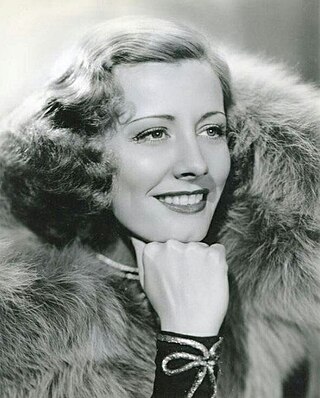
Irene Dunne was an American actress who appeared in films during the Golden Age of Hollywood. She is best known for her comedic roles, though she performed in films of other genres.
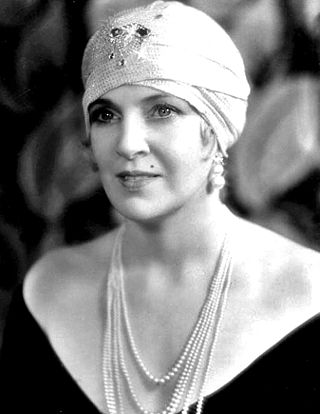
Olga Vladimirovna Baklanova, known professionally as Olga Baclanova, was a Russian-born actress who found success in Hollywood films, as well as stage roles in the US and the United Kingdom, she was mainly billed as an exotic blonde temptress, who was given the title of the "Russian Tigress".
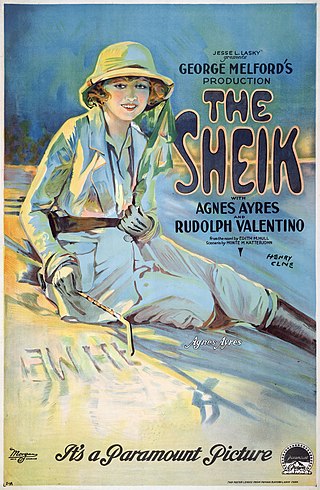
The Sheik is a 1921 American silent romantic drama film produced by Famous Players–Lasky, directed by George Melford, starring Rudolph Valentino and Agnes Ayres, and featuring Adolphe Menjou. It was based on the bestselling 1919 romance novel of the same name by Edith Maude Hull and was adapted for the screen by Monte M. Katterjohn. The film was a box-office hit and helped propel Valentino to stardom.
The Great Lover may refer to:

Broken Barriers is a 1924 American silent drama film starring James Kirkwood, Norma Shearer, and Adolphe Menjou. Directed by Reginald Barker, the film is based upon the novel of the same name by Meredith Nicholson.
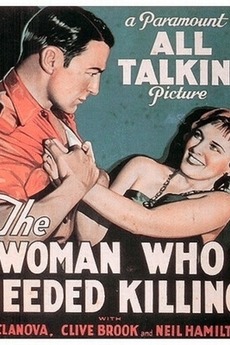
A Dangerous Woman is a 1929 American Pre-Code film released by Paramount, based on the Margery Lawrence story, A Woman Who Needed Killing. It was directed by Gerald Grove and Rowland V. Lee from a script by John Farrow and Edward E. Paramore Jr.
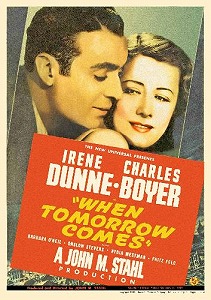
When Tomorrow Comes is a 1939 American romantic drama directed by John M. Stahl, and starring Irene Dunne and Charles Boyer. The screenplay concerns a waitress who falls in love with a man who later turns out to be a married concert pianist. Bernard B. Brown won the Academy Award for Best Sound.

Together Again is a 1944 comedy film directed by Charles Vidor and starring Irene Dunne and Charles Boyer. The screenplay was written by F. Hugh Herbert and Virginia Van Upp, based on story by Herbert J. Biberman and Stanley Russell. The supporting cast features Charles Coburn and Mona Freeman.

The Street of Sin (1928) is an American silent film directed by Mauritz Stiller. It starred Emil Jannings, Fay Wray and Olga Baclanova. It was distributed by Paramount Pictures.
Father Takes a Wife is a 1941 American comedy film starring Gloria Swanson and Adolphe Menjou. Silent screen queen Gloria Swanson returned to films after a seven-year absence. Eight years later, Swanson staged another comeback in the classic Sunset Boulevard (1950).

Singed Wings is a lost 1922 American silent romantic drama film directed by Penrhyn Stanlaws and starring Bebe Daniels. Famous Players–Lasky served as producers with the usual released through Paramount Pictures.
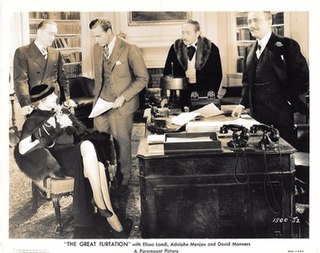
The Great Flirtation is a 1934 American pre-Code comedy drama film directed by Ralph Murphy and starring Elissa Landi, Adolphe Menjou, David Manners and Lynne Overman. The film was released on June 15, 1934 by Paramount Pictures. It was based on an unpublished story I Love an Actress by Gregory Ratoff and adapted by Humphrey Pearson.

The Circus Queen Murder is a 1933 American pre-Code mystery film directed by Roy William Neill and starring Adolphe Menjou, Donald Cook and Greta Nissen. It is the sequel to the 1932 film The Night Club Lady in which Menjou had also starred as Thatcher Colt. The film is based on a story by "Anthony Abbott", a pseudonym used by Fulton Oursler.
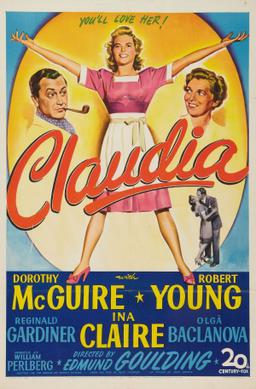
Claudia is a 1943 American comedy-drama film directed by Edmund Goulding, and written by Morrie Ryskind. The film stars Dorothy McGuire, Robert Young, Ina Claire, Reginald Gardiner, Olga Baclanova, and Jean Howard. The film was released on November 4, 1943, by 20th Century Fox. The film was based on a Broadway play of the same name from 1941. It is followed by a sequel in 1946 Claudia and David.

The Great Lover is a 1920 American silent drama film directed by Frank Lloyd and starring John St. Polis, Richard Tucker and Claire Adams.
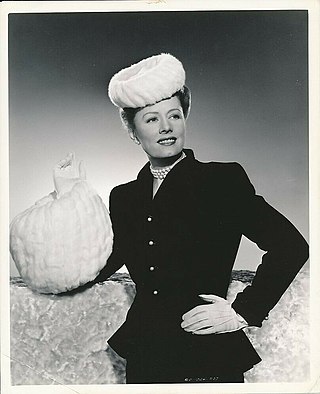
The following features lists of the film and television performances of actress and singer Irene Dunne (1898–1990), who appeared in 42 movies between 1930 and 1952, and was nominated for the Academy Award for Best Actress five times. She is best known for appearing in the screwball comedy films The Awful Truth, Theodora Goes Wild, and My Favorite Wife, as well as the romantic drama Love Affair.
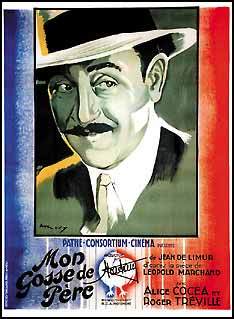
My Childish Father is a 1930 French drama film directed by Jean de Limur and starring Adolphe Menjou, Roger Tréville and Alice Cocéa. It is based on the 1925 play of the same title by Léopold Marchand which was later remade in 1953 as My Childish Father. The film's sets were designed by the art director Jacques Colombier. It was one of twelve sound films produced by Pathé-Natan that year following the conversion from silent film. A separate English-Language version The Parisian was produced, also starring Menjou.


















